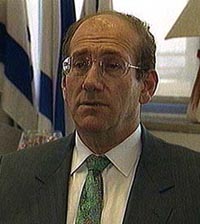Olmert ally meets with Palestinian leader
Elder statesman Shimon Peres met secretly in Jordan with Palestinian President Mahmoud Abbas with the blessing of acting Prime Minister Ehud Olmert, Israel said Monday, ending a ban that followed the January victory of the militant Islamic Hamas in Palestinian elections. Olmert's office said the meeting dealt only with economic affairs. However, Israel TV's Channel 2 said other issues were discussed as well. The Jordanian government confirmed the meeting took place but had no details about the content. Palestinian officials had no immediate comment.

Olmert has said he had no intention of meeting with Abbas after the Hamas win. However, Olmert has also distanced himself from statements by his foreign minister, Tzipi Livni, that the moderate Abbas has become irrelevant. Peres, a key Olmert ally in the new Kadima Party, re-established Israeli contact with Abbas just two weeks before Israel's election. Kadima holds a wide lead, but Olmert has been taking steps to stem a small but steady drop in support.
The Peres-Abbas meeting apparently was meant to attract the support of moderate voters. Peres is a former leader of the dovish Labor Party and an architect of interim peace deals with the Palestinians. He refused to endorse an earlier ban, in which Olmert said there must be no meetings with Abbas without his permission. Peres and other doves have insisted that despite the Hamas victory, Israel must maintain contact with Abbas, head of the Fatah Party defeated by Hamas in the parliamentary vote. Abbas was elected president of the Palestinian Authority in January 2005 and has three years left to serve, regardless of the makeup of the parliament or Cabinet.
Abbas has said he might retain control of contacts with Israel, while Hamas handles internal issues. However, Israel and Abbas have not fared well in the past. Israel charged that Abbas did not crack down on violent groups as required by the internationally backed "road map" peace plan. Abbas complained that the Israelis were taking no steps to boost his regime; instead, adding obstacles like West Bank roadblocks and settlement construction.
In Gaza, Hamas negotiators met through the day with leaders of other Palestinian factions. Hamas has until the end of the month to form a government. Since it has an absolute majority in the parliament, it could go it alone, but incoming Prime Minister Ismail Haniyeh has said he wants as broad a government as possible, even including Fatah.
However, its platform is likely to keep Fatah on the sidelines. Hamas officials have said they favor continued "resistance" to Israeli occupation as a legitimate right, refusing to renounce violence, and they also decline to endorse the interim peace accords with Israel, signed by Fatah. Israel has already cut off transfer of tens of millions of dollars a month in taxes and customs, and Western donors are weighing the dilemma of trying to alleviate poverty among the Palestinian people without financing Hamas. Israel, the U.S. and European Union list Hamas as a terror group because it has sent dozens of suicide bombers into Israel hough none in the past year during a cease-fire.
Olmert is under fire from all side for his moderate policy toward the Palestinians a situation that might well suit a candidate searching for votes from the center, a concept that has not existed before in Israel's polarized political scene. Prime Minister Ariel Sharon created the center in a single dramatic move, forming Kadima in November after quitting Likud over its opposition to his unilateral pullout from Gaza last summer. Olmert took over after Sharon was felled by a massive stroke on Jan. 4. He remains in a coma.
Olmert breathed life into a sleepy campaign over the weekend when he spelled out his plans for the West Bank saying he would withdraw from significant parts and move settlers from outlying locations into settlement blocs Israel would keep. He said he preferred peace negotiations, but with Hamas in control of the Palestinian government, he was prepared to move unilaterally. Likud leader Benjamin Netanyahu said Olmert has transformed the election into a referendum on the future of the West Bank, reports the AP.
N.U.
Subscribe to Pravda.Ru Telegram channel, Facebook, RSS!


